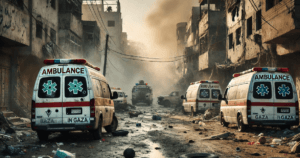Israel Admits Firing on Ambulances in Gaza – Shocking Truth Behind 6 Missing Rescuers
Israel’s military admitted to firing on ambulances in Gaza, claiming they were “suspicious vehicles.” The attack occurred in Rafah’s Tal al-Sultan neighborhood, where six rescue workers went missing. Days later, the body of their team leader was found alongside the wreckage of an ambulance, a firefighting truck, and a Palestine Red Crescent vehicle. The Israeli military stated that its troops initially targeted vehicles believed to be used by Hamas but later realized some were medical and emergency response vehicles.
Israel accused Palestinian militant groups of misusing ambulances, though it did not confirm whether gunfire came from them. Hamas condemned the attack as a “war crime” and a violation of international law, while the United Nations criticized the rising civilian death toll from Israeli airstrikes. UN officials urged global leaders to uphold humanitarian laws and protect rescue workers. The ongoing violence in Gaza, reignited after a brief truce ended on March 18, has led to widespread devastation and loss of life.

Israel Admits Firing on Ambulances in Gaza – Shocking Truth Behind 6 Missing Rescuers
Israel’s military has acknowledged attacking ambulances in Gaza’s Tal al-Sultan neighborhood last Sunday, alleging the vehicles were “suspicious” and linked to Hamas. The incident, which occurred in Rafah, left six rescue workers missing. Days later, the body of their team leader was recovered alongside the wreckage of an ambulance, a firefighting truck, and a Palestine Red Crescent Society vehicle, according to Gaza’s civil defense agency.
The Israeli military initially claimed its forces targeted vehicles belonging to Hamas militants, killing several fighters. When additional vehicles arrived at the scene, troops fired again, suspecting militant activity. However, an internal review later revealed that some of the vehicles were ambulances and fire trucks. While Israel accused Palestinian groups of exploiting medical vehicles for combat, it did not provide evidence of gunfire originating from the ambulances during the attack.
Hamas strongly condemned the incident, calling it a “premeditated massacre” of first responders—a violation of international humanitarian law, which grants protected status to medical personnel during conflicts. The group accused Israel of committing a war crime and disregarding the Geneva Conventions, which safeguard civilians and aid workers in war zones.
The United Nations echoed these concerns, with Tom Fletcher of the UN Office for the Coordination of Humanitarian Affairs condemning the rising civilian casualties from Israeli airstrikes. He highlighted reports of patients killed in hospitals, ambulances under fire, and first responders losing their lives while aiding the injured. Fletcher urged global leaders to intervene, stressing the urgent need to enforce humanitarian laws and protect vulnerable populations.
Escalating Violence and Civilian Toll
The attack comes amid intensified violence in Gaza following the collapse of a short-lived truce on March 18. Israel’s renewed airstrikes have caused widespread devastation, flattening neighborhoods and crippling infrastructure. Over 34,000 Palestinians have been killed since the conflict began in October, with women and children comprising a majority of the casualties, according to Gaza health officials.
Humanitarian organizations have repeatedly raised alarms about the targeting of medical facilities and workers. The World Health Organization reports that nearly 400 health workers have been killed in Gaza since October, while over 150 UN aid workers have also lost their lives. Hospitals, already overwhelmed by casualties and shortages, face repeated raids and bombings. In April, an Israeli strike on a Gaza City ambulance convoy killed four medics and two patients, drawing widespread condemnation.
Disputed Claims and Accountability
Israel maintains it adheres to international law and accuses Hamas of embedding militants within civilian areas, including hospitals—a claim Hamas denies. The military argues that Hamas’ alleged use of ambulances to transport fighters and weapons justifies strikes on these vehicles. However, critics argue such actions disproportionately harm civilians and erode trust in protected humanitarian symbols like the Red Crescent.
The attack in Tal al-Sultan has intensified calls for independent investigations. Human Rights Watch and other groups accuse Israel of repeatedly failing to uphold proportionality—a key principle of international law requiring military actions to avoid excessive civilian harm. Meanwhile, Hamas faces scrutiny for its rocket attacks on Israeli communities, though the scale of Palestinian casualties has drawn sharper global criticism toward Israel.
Aid Workers in the Crossfire
First responders in Gaza describe operating in constant peril. “We’re risking our lives every minute,” said Mohammed al-Mughair, a paramedic in Rafah. “But if we stop, who will help the wounded?” The Palestine Red Crescent Society reported over 40 ambulance strikes since October, forcing crews to abandon uniforms and operate covertly to avoid detection.
The UN warns that Gaza’s healthcare system is nearing collapse. Only 12 of 36 hospitals remain partially functional, with many operating without electricity or critical supplies. Malnutrition and disease outbreaks further compound the crisis, leaving 1.1 million people—half of Gaza’s population—facing “catastrophic” food insecurity.
International Response and Future Challenges
The Biden administration recently delayed a weapons shipment to Israel, signaling growing U.S. unease over civilian casualties. However, global pressure has yet to curb the violence. As diplomatic efforts stall, aid groups emphasize that without immediate ceasefires and unrestricted humanitarian access, Gaza’s civilian toll will continue to rise.
The attack on ambulances in Rafah underscores a broader pattern of civilian infrastructure being caught in the crossfire. With neither side showing signs of de-escalation, the international community faces mounting urgency to broker a lasting peace and uphold the laws designed to protect the most vulnerable in wartime.
You must be logged in to post a comment.